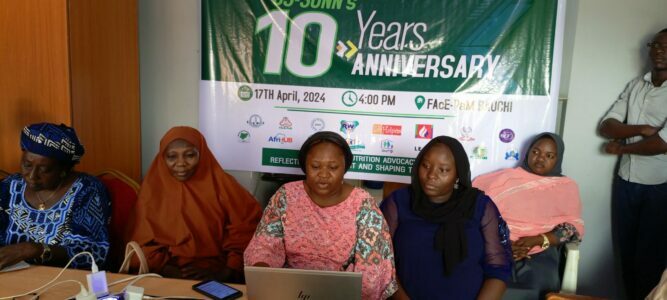
Governments at all levels in the country have been urged to introduce policies and programmes that will promote healthy living of women and children under five years through effective nutrition and balanced diet.
The call was made by Civil Society Scaling-Up Nutrition in Nigeria (CS-SUNN) which is is a non-governmental, non-profit making alliance, made up of organizations with a shared vision to transform Nigeria into a country where every citizen has food and is nutrition secured.
CS-SUNN while briefing Journalists at the FacePam office on the activities to celebrate 10 years of its existence in the country stated that it is pursuing the lofty goal by engaging government and non-state actors to raise awareness, sustain commitment and actions to effectively tackle under-nutrition in Nigeria.
Speaking on behalf of organisations, Mrs Dabis Mwaike, CS- SUNN Secretary stated that, “Today marked the Eight days since the countdown to CS-SUNN at 10 years anniversary began. In the past 8 days, the Civil Society Scaling Up Nutrition in Nigeria has been reflecting on its journey to curb Malnutrition in the country, its impact. In two days’, time, the event will be celebrated.”
She added that, “As a country, the reflection has been on: 10 years of empowering communities, advocating for nutrition, and driving positive change across Nigeria. 10 years of impactful work and looking forward to even more food and nutrition secured Nigeria.”
According to her, “CS-SUNN has led Nigerian Civil Societies in partnership with government agencies, development partners, the media, and communities to implement nutrition interventions nationwide. Dedication to nutrition advocacy and action.”
Mrs Dabis Mwaike added that “Donors and partners support and commitments to improving nutrition in Nigeria inspire us. Decade of impact in the fight against malnutrition in Nigeria, the story of nutrition policies, plans, developments, improving funding for nutrition in Nigeria.”
She stressed that the importance of partnerships and community engagements in achieving nutrition goals cannot be over-emphasized considering the importance of the process.
Mrs Dabis Mwaike however lamented that despite all these achievements, Malnutrition remains a concern to public health and a threat to child survival, growth, and development in the country and Bauchi State in particular.
According to NNHS (2018) and NDHS (2018) the State stunting rate is 46%, wasting is 9.5% while underweight is 28.2% and overweight is 0.5 %.
CS-SUNN was inaugurated in Bauchi in 2018, and as part of the celebration, it is reflecting on the Partnership with international partners, the State committee for food and Nutrition.
CS-SUNN members also participated in the development of the Bauchi State Policy on Food and Nutrition, Multisectoral plan of Action for nutrition, among other policies and documents while through advocacy, efforts on nutrition budget line has been created.
Also, Community mobilization and engagements in achieving nutrition goals as well as Support of religious/traditional leaders in creating awareness for uptake of nutrition services and Strong collaboration with SCFN and state Primary Healthcare Development Agency.
The CS- SUNN Secretary stressed that With support of partners and donors, the organisation has been able to implement both nutrition specific and sensitive interventions.
On the lessons learnt, She outiled it to include: Community structures (Mama2Mama, CHIPS) are effective in reaching communities with key nutrition messages and mobilizing communities for the uptake of nutrition services stressing however that they need motivation.
On Food Bank Concept She explained that this concept has impacted positively as a measure to combating menace of malnutrition in the community of intervention evidence by recovery documented on the nutrition tracker.
There was also use of volunteers to drive the initiative inclusive and geo-coverage, there is a need for more time as well as more CBVs to help reduce turn-around time for facility based and follow-up and alignment to the visits.
The Holistic Approach is Adopting a comprehensive approach that addresses multiple needs of vulnerable populations, including education, healthcare, nutrition, and livelihoods, leading to more sustainable and impactful outcomes.
On Partnerships and Collaboration, Collaborating with government agencies, NGOs, private sector actors, and community-based organizations has allowed for leveraging of resources, expertise, and networks to maximize impact and reach.
Monitoring and Evaluation encouraged regular monitoring, evaluation, and learning processes to enable project stakeholders to assess progress, identify gaps and challenges, and make informed decisions for program improvement and sustainability.
Different capacity building training such IPC-MIYCN, on the job coaching and mentoring during supportive supervision enhanced the ability of frontline health workers to deliver optimal services while willingness of the community leadership to own the process and project when involved in the activity implementation was stressed.
Also read: Tunde Onakoya beats US national chess master in GWR attempt
Source: